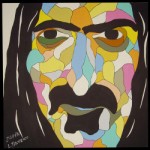 Frank Zappa was one of the most accomplished composers of the rock era. His music had an understanding of and appreciation for such figures as Stravinsky, Stockhausen and Varese with an affection for late 50s doo wop rock and roll, and a facility for the guitar-heavy rock that dominated US music in the 70s. Frank Zappa was one of the most accomplished composers of the rock era. His music had an understanding of and appreciation for such figures as Stravinsky, Stockhausen and Varese with an affection for late 50s doo wop rock and roll, and a facility for the guitar-heavy rock that dominated US music in the 70s.
But Frank Zappa was also a satirist whose reserves of scorn seemed bottomless, and whose wicked sense of humour and absurdity have delighted his fans, even when his lyrics crossed over the broadest bounds of good taste.
Finally, Frank Zappa was perhaps the most prolific record-maker of his time, turning out massive amounts of music on his own Barking Pumpkin label after long, unhappy associations with industry giants like Warner Brothers and the MGM.
Frank Zappa became interested in music at school and continued his studies up through Chaffey College in California.
He scored a couple of low-budget films and used the money to buy a low-budget recording studio.
In 1964 he joined a local band called "The Soul Giants", which over the next two years evolved into the "Mothers Of Invention" who played songs written by Frank Zappa.
The band was signed to MGM and recorded its first album, a two LP set called "Freak Out!", which introduced Frank Zappa's interests in both serious music and pop as well as his scathing wit.
Subsequent albums extended the musical and lyrical themes of the debut - and the albums came frequently. Three LPs hit the charts in 1968; "We're Only In It For The Money", "Sgt Pepper Lumpy Gravy " and "Cruising With Ruben and The Jets" (on which the Mothers play neo-doo wop).
Frank Zappa disbanded "The Mothers of Invention" in August 1968, because of "people who clap for all the wrong reasons".
In 1970, Zappa assembled a new version of "The Mothers", featuring former "Turtles " lead singers Mark Volman and Howard Kaylan as front men. The line-up moved the group more in the direction of X Rated comedy, notably on the album "Fillmore East" June 1971.
Also in 1971, during Zappa's set at the Montreux Casino on the shores of Lake Geneva in Switzerland on December 3, an audience member seeking to enhance the band's special effects, fired a flare gun into the wings and started a fire that completely destroyed the building. While Frank Zappa played a major part in shepherding the crowd to safety, "The Mothers" had $50,000 of equipment destroyed.
Members of "Deep Purple" (who were at the gig as they were waiting to begin recording an album in the venue the next day) retired to the terrace of their hotel to watch the blaze. Downdrafts from the mountains pushed the fire out over the lake, inspiring "Deep Purple" to pen "Smoke On The Water" - one of hard rock's most enduring anthems.
Zappa's problems were only beginning. A week later (during a performance at the Rainbow Theatre in London) the jealous boyfriend of an ardent female fan jumped on stage and shoved Frank Zappa off the stage and into the orchestra pit. He fractured his skull, broke his leg in several places and had to spend nine months in a wheelchair.
While he recovered, Frank Zappa released several albums, then he re-formed "The Mothers" with himself as lead singer and made pop/rock albums such as "Overnite Sensation", which were among his best selling records ever.
By the end of the 70s, Frank Zappa was recording on his own labels and had attracted a considerable cult following for both his humour and his complex music - Frank Zappa's band became a training ground for high quality rock musicians.
In the 80s, Frank Zappa gained the rights to his old albums and began to re-issue them, at first on his own and then through the pioneering Rykodisc CD label.
He wrote his autobiography and embarked on a world tour in 1988,which was to be the end of his live performing, except for such isolated appearances as one in Czechoslovakia at the invitation of its post-Communist president, Vaclav Havel.
In 1991, it was confirmed that Frank Zappa had prostate cancer. He succumbed to the disease on December 4th, 1993, dying at his Los Angeles home.
|